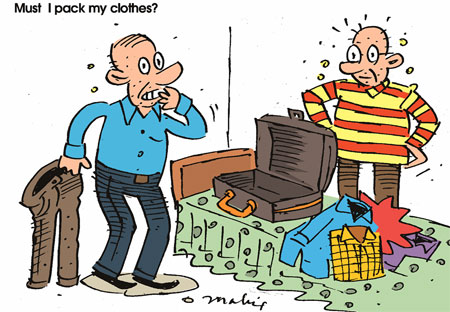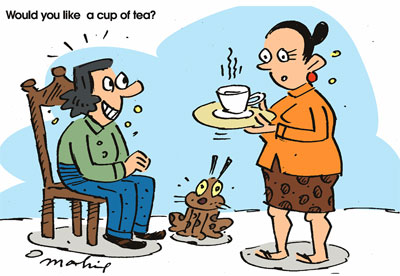|

by R. S. Karunaratne
More on modal verbs
“Must, shall, should, will” and “would” are modal verbs. In a
statement they are used before the base form of a verb or a “be” verb.
[Must ]

We use “must” to indicate that something is a rule or is necessary.
You must obtain a passport to go abroad.
I must get some rest now.
Travellers must carry their identity cards.
Devotees must remove their shoes before entering the temple.
We must be in office at 8.30 a.m.
We use “must” to indicate that something is sure to be true.
Agatha must be Joyce’s sister.
He must be the principal of the college.
Nelum must be the new English teacher.
They must be tourists looking for accommodation.
These children must have come from Colombo.
We use “must” in questions to ask whether something is necessary.
Must we get ready for the trip now?
Must I pack my clothes?
Must she sit the examination this year?
Must I work so hard to pass this examination?
Must I apologise to you?
Shall / will
We use “shall” and “will” to indicate the strong possibility of an
action or event taking place in the future. “Shall” is used only with
“I” or “We.”
I shall be at the airport at 3 p.m.
We shall be there before noon.
They will call you for an interview.
He will be your guide during the tour.
The baby will sleep soundly tonight.
[Should ]
We use “should” to indicate that something will probably take place.
He should be in office now.
The train should be here in ten minutes.
Kevin should be able to help us.
You should get the results very soon.
I should pass the examination this year.

We use “should” to indicate that something is considered the right
thing to do.
We should help the poor.
You should not waste your time.
They should look after their parents.
People should respect the law.
Children should receive a religious education.
We use “should” in questions to ask for advice.
Should I follow this course?
Should I go by bus?
Should I wear a tie for the interview?
Will / would
We use “will” and “would” in questions to make requests for help.
Would you tell her that I called?
Would you like something to read?
Will you hurry up, please?
Will you tell your son to meet me tomorrow?
Would you like to contribute to the Reader’s Digest?
We use “would” followed by “you like” to make an offer.
Would you like a cup of tea?
Would you like to visit the museum?
Would you like to see my wedding album?
Would you like to meet my best friend?
Would you like to wait for me?
[Activity ]
Fill in the blanks with “shall, will, should”, or “must”. Check your
answers with the key.
1. The river looks inviting. .................. we have a swim?
2. I think we .................. send her a letter of apology.
3. You have cut your finger. I .............. be hurting you a lot.
4. Her condition is serious. You ............ call doctor.
5. I hope my sister .................. be here on time.
6. .................. you like to contribute Rs. 1,000 for the building
project?
7. You ................ get the results very soon.
8. ................. you bring the bill, please?
9. You ............... be the new receptionist?
10. ................. we join the Literary Circle?
Key:
1. Shall 2. should 3. must 4. must 5. will 6. Would 7. should 8. Will
9. must 10. Shall
Current English usage
Being a living language, English is subject to changes from time to
time. Here’s help for you to be aware of current changes taking place in
the language.
1. allergy / aversion
An allergy is an oversensitive reaction by the body to some
substance. Some people are allergic to cats. Aversion is a feeling of
strong dislike. Some employees in the State sector have an aversion for
hard work.
2. although / though
Both words have the same meaning but “though” is considered to be
more colloquial. It means, “despite the fact that.” My friends are
coming home next week, though I don’t know which day. “Although” also
means, “despite the fact that.” I decided to swim across the river,
although I knew that it was dangerous.
3. amateur / novice / tyro
An amateur is someone who takes part in an activity for pleasure. He
is not a professional. Sometimes, the word is used with a derogatory
sense.
They are a bunch of amateurs. A novice is a person who is not
experienced in a job or situation. There are novice gardeners and novice
monks. A tyro is a person who is new to an activity. The audience hailed
the young tyro’s maiden performance in the play.
4. ambiguous / ambivalent
“Ambiguous” means “having or expressing more than one meaning.” Her
reply to my question was somewhat ambiguous. “Ambivalent” means “having
two opposing feelings at the same time. I have ambivalent feelings
towards my son.
5. amiable / amicable
Both words imply friendliness. However, “amiable” describes a person
or his behaviour that is friendly. An amiable young man came for the
interview. “Amicable” refers to behaviour between people. We reached an
amicable settlement.
6. among / amongst / between
We use “between” to connect two people, objects or ideas.
The competition is open to children between 10 and 15 years. “Among”
is used in connection with several things.
He shared the money among his family members. “Amongst” is frequently
used but it is considered to be an old-hat.
7. amoral / immoral
“Amoral” means “without moral principles.” An amoral person has no
regard for morals. To be “immoral” is to offend against established
principles. People condemned his immoral behaviour.
8. amuse / bemuse
“Amuse” means to entertain somebody by humorous speech or action or
by making somebody laugh. Some newspaper headlines such as “Three held
in cigarette case” will amuse you! “Bemuse” is “to confuse.” I was
rather bemused by her sudden anger.
9. analysis / synthesis
“Analysis” means “examination of something in detail.” I
wasinterested in her analysis of the tense situation. “Synthesis” means
“combination and building something from various elements.”
He describes his music as a synthesis of oriental and western rhythm.
Starters:
Singular and plural nouns
We usually make singular nouns plural by adding an “-s.”
a chair: four chairs
a month: two monthsa
cow: six cows

a boy: ten boys
a tree: many trees
For words ending in “s, sh, ch,” and “x” we add “-es” to make the
plural.
bus: buses
dish: dishes
church: churches
box: boxes
For certain words ending in “o” we add “es” to make the plural.
potato: potatoes
tomato: tomatoes
mosquito: mosquitoes
For words ending in “y” we add “ies” to make them plural.
baby: babies
party: parties
lady: ladies
dictionary: dictionaries
ruby: rubies
Exceptions:
day: days
monkey: monkeys
boy: boys
guy: guys
For words ending in “f” or “fe”, we add “ves” to make them plural.
shelf: shelves
knife: knives
wife: wives
The following words are always plural. They have no singular form.
scissors, glasses, trousers, jeans, shorts, pyjamas, tights
There are some plural words which do not end in “s” or “es.”
man: men
woman: women
child: children
foot: feet
mouse: mice
tooth: teeth
Certain singular words do not change when forming the plural.
deer: deer
sheep: sheep
fish: fish
The plural of “person” is “people” not “persons.”
He is a nice person.
They are nice people.
“Police” is a plural word.
The police are investigating the murder.
[Activity]
Write the plural of the following nouns. Check your answers with the
key.
1. flower : .....................
2. man : ....................
3. ship : ....................
4. boat : ..................
.5. language : .............
6. watch : ...............
.7. continent : .................
.8. city : ....................
9. country : .....................
10. knife : .....................
11. woman : .....................
12. address : ...........................
13. sheep : .......................
.14. tooth : ..................
.15. leaf : ...................
.16. child : ..................
17. foot : .................
.18. umbrella : ...................
19. person : ......................
20. family : .........................
21. holiday : .........................
22. 22sandwich : ....................
23. mouse : .......................
24. elephant : ....................
25. lady : ....................
Key:
flowers 2. men 3. ships 4. boats 5. languages 6. watches 7.
continents 8. cities 9. countries 10. knives 11. women 12. addresses 13.
sheep 14. teeth 15. leaves 16. children 17. feet 18. umbrellas 19.
people 20. families 21. holidays 22. sandwiches 23. mice 24. elephants
25. ladies
Verbs ending in ‘ing’
Fill in the blanks with the following words ending in ‘ing’. Check
your answers with the key.
listening, speaking, talking, dancing, swimming, climbing, riding,
sitting, kicking, driving, doing, going, eating, playing, listening,
going, going, watching, cooking, reading
1. Nilu likes ............... books.
2. Kushani likes ................. food.
3. Namasivayam likes ................. television.
4. Priya likes ................... to the cinema.
5. Lal likes ................... for walks.
6. Lilian likes ................... to music.
7. Sunanda likes ...................... the piano.
8. Mary likes .................. out.
9. Sithira likes ................. for a run.
10. Lourdes likes ................... aerobics.
11. Suresh likes .................. a car.
12. Sam is ............... a ball.
13. Jayam is ................. on a chair.
14. Tissa is ..................... a bicycle.
15. Anura is .................... a mountain.
16. They are .................... in the sea.
17. Ganga is ................... to the music.
18. The teacher is .................... to a student.
19. Gabriel is .................. in French.
20. The students are ..................... to the teacher.
Key:
1. reading 2. cooking 3. watching 4. going 5. going 6. listening 7.
playing 8. eating 9. going 10. doing 11. driving 12. kicking 13. sitting
14. riding 15. climbing 16. swimming 17. dancing 18. talking 19.
speaking 20. listening
Phrasal verbs
Complete the phrasal verbs with ‘off’ or ‘up’. Check your answers
with the key.
1. You must try to give ....... smoking.
2. If you put milk in the refrigerator, it will not go .......... .
3. The plane will take ....... at 7.30 a.m.
4. He was brought ..... by his uncle.
5. I told him ..... for spilling tea on my table.
6. You must save ..... if you want to buy yourself a laptop.
7. When you grow ..... , you will become an engineer.
8. He is very unpopular in office. He always shows ...........
9. Don’t put ....... what you’ve to do today.
10. Hurry .........., we’re already late.
Key
1. up 2. off 3. off 4. up 5. off 6. up 7. up 8. off 9. off 10. up |

